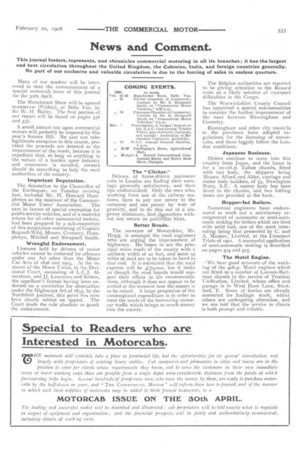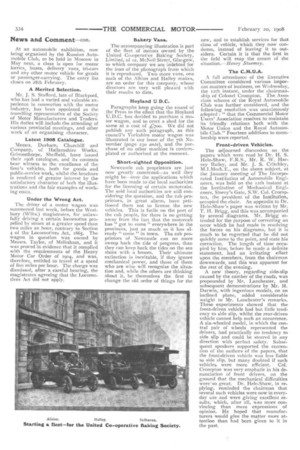News and Comment.
Page 17

Page 18

If you've noticed an error in this article please click here to report it so we can fix it.
This journal fosters, represents, and chronicles commercial motoring in all its branches; it has the largest and best circulation throughout the United Kingdom, the Colonies, India, and foreign countries generally. No part of our exclusive and valuable circulation is due to the forcing of sales in useless quarters.
Many of our readers will be interested to note the announcement of a special inotorcab issue of this journal for the 30th April.
The Manchester Show will be opened to-morrow (Friday), at Belle Vue, by Sir W. H. Bailey. The first portion of our report will be found on pages 536 and 537.
A small annual tax upon commercial motors will probably be imposed by this year's finance Bill. No user can take legitimate exception to this course, provided the proceeds are devoted to the improvement of the roads, because it is expedient that, so long as anything in the nature of a burden upon industry and commerce is avoided, owners should do something to help the road authorities of the country.
Important Deputation.
The deputation to the Chancellor of the Exchequer, on Tuesday evening last, included Mr. Fl. Howard Hum. phreys as the nominee of the Commer
cial Motor Users' Association. The case in favour of special exemption for public-service vehicles, and of a material rebate for all other commercial motors, had been prepared by a sub-committee of this association consisting of Captain Bagnall-Wild, Messrs. Coventry, Humphreys, Mitchell and Shrapnell Smith.
Wrongful Endorsement,
Licenses held by drivers of motor vehicles cannot be endorsed for offences under any Act other than the Motor Car Acts of 1896 and 1903. At the instance of the Motor Union, in the Divisional Court, consisting of L.C.J. Alverstone, and JJ. Lawrence and Sutton, the appellant's license having been endorsed•on a conviction for obstruction under the Highways Act of 1835, by the Northfield justices, this point has now been clearly settled on appeal. The Court made the rule absolute to quash the endorsement.
The "Clicker."
Drivers of horse-drawn taximeter cabs in London are finding their earnings generally satisfactory, and their tips undiminished. Only the men who, working from one of the railway stations, have to pay one penny to the company and one penny by way of gratuity, and to do this out of a sixpenny minimum, find thtirnselves without any return on partinlar hires.
Better Roads.
The surveyor of Morayshire, Mr. Hogg, is amongst the road engineers who are urging the improvement of highways. He hopes to see the principal main roads of the county with a uniform width of 20 feet, and some 95 miles of road are to be taken in .hand to that end. It is estimated that the total expensee ill h 1." W... — ,79,000, but it looks as though the road boards would sup.port their officer in his recommendations, although it does not appear to be settled at the moment how the money is to be raised. A large proportion of the contemplated expenditure is in order to meet the needs of the increasing motorcar traffic which brings so much money into the county.
The Belgian authorities are reported to be giving attention to the Renard train as a likely solution of transport difficulties in the Congo.
The Warwickshire County Council has appointed a special sub-committee to consider the further improvement of the road between Birmingham and Coventry.
Birmingham and other city councils in the provinces have adopted regulations for the licensing of motorcabs, and these largely follow the London conditions.
Japanese Business.
Orders continue to come into this country from Japan, and the latest is for a lo-izh.p. Talbot chassis, fitted with van body, the shippers being Messrs. Alford and Alder, carriage and motor body builders, of 53, Newington Butts, S.E. A roomy body has been fitted to the chassis, and two folding doors are provided at the back.
Hopper-fed Boilers.
Numerous engineers have endeavoured to work out a satisfactory arrangement of automatic or Semi-automatic stoking for boilers which are fired with solid fuel, one of the most inter, esting being that presented by C. •and A. Musker, Limited, at the Liverpool Trials of 1901. A successful application of semi-automatic stoking is described on pages 524 and•525.
The Mutel Engine.
• We hear good accounts of the working of the q.oh.p. Mutel engines which ate fitted to a number of Lacoste-Battman chassis in the service of Traction Unification, Limited, whose office and garage is in West Ham Lane, Stratford, E. Some 17 lorries are already converted for haulage work, whilst others are undergoing alteration, and we are told that the service to clients Es both prompt and reliable.
At an automobile exhibition, now being organised by the Russian Automobile Club, to be held in Moscow in May next, a class is open for motor lorries, buses, delivery vans, tri-cars and any other motor vehicle for goods or passenger-carrying. The entry list closes on 28th February.
A Merited Selection.
Mr. J. S. Stafford, late of Blackpool, who has had a varied and valuable experience in connection with the motor industry, has been appointed as the travelling representative of the Society of Motor Manufacturers and Traders. His duties will include the attending of various provincial meetings, and other work of an organising character.
Latest 1908 Catalogue.
Messrs. Durham., Churchill and Company, of Hallamshire Works, Grimesthorpe, Sheffield, have issued their 1908 catalogue, and its contents bear witness to the excellence of the firm's vehicles, both for goods and public-service work, whilst the brochure is rendered of greater interest by the satisfactory character of both the illustrations and the fair examples of working costs.
Under the Wrong Act.
The driver of a motor wagon was summoned last week, before the Westbury (Wilts.) magistrates, for unlawfully driving a certain locomotive propelled by steam at a greater speed than two miles an hour, contrary to Section 4 of the Locomotives Act, 1865. The wagon in question was owned by Messrs. Tayler, of Melksham, and it was proved in evidence that it complied with the requirements of the Heavy Motor Car Order of 1904, and was, therefore, entitled to travel at a speed of five miles per hour. The charge was dismissed, after a careful hearing, the magistrates agreeing that the Locomotives Act did not apply.
Bakery Vans.
The accompanying illustration is part of the fleet of motors owned by the United Co-operative Baking Society, Limited, of /2, McNeil Street, Glatigow, to which company we are indebted for the loan of the photograph from which it is reproduced. Two more vans, one each of the Albion and Halley makes, are on order for this company, whose directors are very well pleased with their results to date.
Hoyland U.D.C.
Paragraphs keep going the round of the Press to the effect that the Hoyland U.D.C. has decided to purchase a motor wagon, and to erect a shed for the same at a cost of L:700. We did not publish any such paragraph, as this council's Yorkshire motor wagon was illustrated in our issue of the 7th November (page 230 ante), and the purchase of no other machine is contemplated or authorised at the moment.
Short-sighted Opposition.
Newcastle cab proprietors are just now greatly concerned—as well they might be—over the applications which have been made to the local authorities for the licensing of certain motorcabs. The said local authorities are still considering the question, and the cab proprietors, in great alarm, have petitioned them not to license the new vehicles. This is futile on the part of the cab people, for there is no getting away from the fact that the tnotorcab has "got to come" everywhere in the provinces, just as much as it has already " come "in town. The cab proprietors of Newcastle can no more sweep back the tide of progress, than they can keep back the tides on the sea shore with a broom. Their ultimate extinction is inevitable, if they ignore mechanical power, and those of them who are wise will recognise the situation and, while the others are thinking about it, be themselves the first to change the old order of things for the
new, and to establish services for that class of vehicle, which they now condemn, instead of leaving it to outsiders. Certain it is that the first in the field will reap the cream of the situation.—Henry Sturtney.
The C.M.U.A.
A full attendance of the Executive Committee considered various imporant matters of business, on Wednesday, the 12th instant, under the chairmanship of Colonel Crompton. The .ASSO. ciate scheme of the Royal Automobile Club was further considered, and the following resolution was unanimously adopted : " that the Commercial Motor Users' Association resolves to maintain its friendly relations both with the Motor Union and the Royal Automobile Club." Fourteen additions to membership were reported, Front-driven Vehicles.
The adjourned discussion on the papers which were read by Dr. H. S. Hele-Shaw, E.R.S., Mr. R. W. Harvey Bailey, and Mr. J. S. Critchley, M.I.Mech.E., on the above subject, at the January meeting of The Incorporated Institution of Automobile Engineers, was held on the 12th instant at the Institution of Mechanical Engineers, Storey's Gate, S.W. Col. Crompton, the president of the Institution, occupied the chair. An appendix to Dr. Hele-Sh.aw's paper was written by Mr. T. H. 13rigg, and this was accompanied by several diagrams. Mr. Briggattended for the purpose of correcting an error which he had made in resolving the forces on his diagrams, but it is much to be regretted that he did not quickly come to the point, and state his correction. The length of time occupied by him, before he made a definite statement, had an irritating effect upon the members, from the chairman downwards, and this was apparent for the rest of the evening.
A new theory, regarding side-slip caused by the camber of the roads, was propounded by Mr. Lanchester, and subsequent demonstrations by Mr. H. Darwin, with ingenious models, on an inclined plane, added considerable weight to Mr. Lanchester's remarks. These experiments showed that the front-driven vehicle had but little tendency to side slip, whilst the rear-driven vehicle cannot help such an occurrence. A six-wheeled model, in which the central pair of wheels represented the drivers, had practically no tendency to side slip and could be steered in any direction with perfect safety. Subsequent speakers supported the contention of the authors of the papers, that the front-driven vehicle was less liable to side slip, but many doubted if such vehicles were more efficient. Col. Crompton was very emphatic in his denunciation of front drivers, on the ground that the mechanical difficulties were' sogreat. Dr. Hele-Shaw, in replying, reminded the chairman that several such vehicles were now in everyday use and were giving excellent results, which, after all, was more Convincing than mere expressions of opinion. He hoped that manufacturers would give the matter more attention than had been given to it in the past.




























